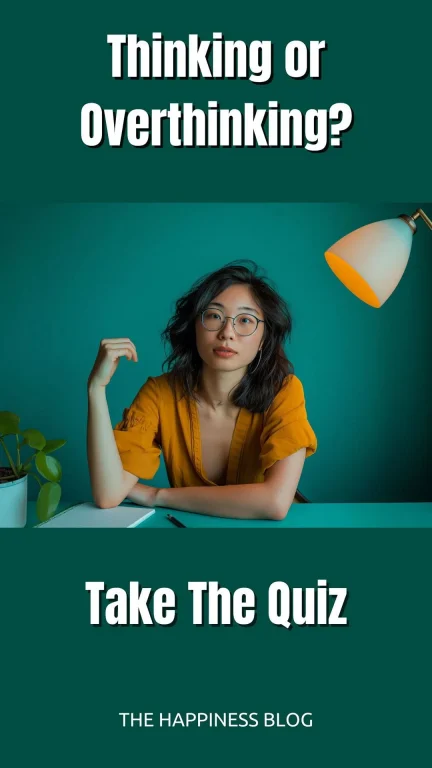Today's Thursday • 15 mins read
“There are more things, Lucilius, that frighten us than injure us, and we suffer more in imagination than in reality.” — Seneca, Stoic Philosopher
Are you often thinking deeply about an issue? But actually, you are overthinking. To find out if you’re thinking or overthinking, we bring you a quick quiz from research.
You’ll also find some fascinating facts on the psychology of overthinking.
Takeaways:
- An overthinker’s thoughts are dark and sad, not optimistic or solution-oriented.
- They recycle the same thoughts about a distressing or negative experience from the past.
- A chronic overthinker can stay stuck on the issue, leading to anxiety, depression, and helplessness.
“Ruminating is rehashing the past, trying in vain to rewrite it.”
Quiz: Are You Reflecting Or Ruminating (Overthinking)
Reflecting is thinking deeply, while ruminating is overthinking. Which one of these are you doing?
Take the quiz to find out: Rumination-Reflection Questionnaire [RRQ] by Trapnell & Campbell (1999).
Rumination-Reflection Questionnaire (RRQ)
Rate each statement on a scale from 1 (Strongly disagree) to 5 (Strongly agree)
Your Results:
RRQ Score Interpretation
Rumination: Reflection:
Your Score Interpretation:
Understanding Your Scores:
Each scale ranges from 1.00 to 5.00:
- 1.00 – 2.33: Low
- 2.34 – 3.66: Moderate
- 3.67 – 5.00: High

Facts On Overthinking From Psychology
- Overthinkers are rather common. Researcher Susan Nolen-Hoeksema found that among people aged 25 to 35, over 70% admitted to overthinking at some point.
- An overthinker is sometimes said to have analysis paralysis, meaning their thoughts make it hard for them to take a decision or action due to over-analysis of options.
- Most thoughts in an overthinker’s mind are sad and pessimistic. They analyze the same thoughts over and over about a negative event from their past.
- The ruminator cannot “avoid” or “stop” thinking the thoughts. They also feel helpless to resolve the issues behind their thoughts, reach a decision or solution, or take action to fix the current concern.
- The overthinker does not have thoughts about many incidents at the same time. Instead, they keep running and analyzing the same event repeatedly, without reaching an end.
- Rumination builds on regret, forcing the overthinker to reimagine how they should have handled the situation back then. As a result, they “suffer more in imagination.”
- When overthinking or rumination becomes chronic and is left untreated, it can lead to anxiety and depression.

What Causes Overthinking?
Overthinking can be an early symptom in people who are already suffering from generalized anxiety disorder (GAD) or major depression. However, rumination can also lead to depression and anxiety.
As research by psychologists shows the two most common causes of overthinking are:
- Passive behavior learned from over-controlling parents
- Stressful, traumatic, and negative events from the past life
1. Passive Behavior Learned From Parents.
Children who learn passive behavior from their parents often go on to develop a habit of overthinking.
One study found children between 5 and 7 years of age who had mothers telling them what to do instead of pushing them to try their own methods to solve problems were more helpless and passive when facing frustrating situations. It can then lead them to overthink.
In another study, college students who reported their parents were overcontrolling showed higher levels of rumination.
2. Stressful & Traumatic Events From Past.
Stressful events can trigger or worsen overthinking.
Stressful life events can indeed trigger overthinking and are linked with higher depression levels in later life, as early as 6 months.
- Researchers found that people who experienced grief and had less social support, more stress, and higher initial depression levels ruminated more. Women were more likely to ruminate than men. Rumination at one month was linked to pessimism, which in turn predicted higher depression levels at six months (Nolen-Hoeksema & Parker, 1994).
- Michl & McLaughlin (2013) explored the ink between stressful life events, rumination, and internalizing symptoms. It found that exposure to stressful life events can increase rumination, which in turn can lead to the development of depression and anxiety.
If overthinking persists for a long period of time, to the point where it interferes with their normal daily functions or radically alters their behavior, one should seek the help of mental health professionals.

10 Side Effects of Overthinking
Habitual rumination can wreck your body and mind in many ways. Overthinkers sleep badly, hardly exercise, and eat mindlessly. There’s more.
1. Anxiety
They are always anxious because they are unable to reach any final point where their thoughts can stop, and then they can take action. More so because they cannot help themselves out of it.
2. Fear
They may reach a point where they start to dread meeting anyone, for these people might say things that might overload them with more negative thoughts.
In severe cases, it can grow into social phobia (also called social anxiety disorder), agoraphobia (fear of being in places where it is hard to escape from or receive help), and autophobia (fear of loneliness.
3. Stress
Distress, or the stress of the debilitating kind, is a close companion of overthinkers.
While rumination causes stress, heightened stress causes further overthinking. It is a self-fulfilling prophecy.
4. Fatigue
Overthinking causes mental fatigue because, understandably, it takes up a lot of mental energy.
Like a hamster running on a wheel, their never stopping racing minds stay drained.
Soon, this effect shows up in their bodies too. Their stressed bodies produce more cortisol, the stress hormone, which can then lead to burnout.
5. Indecision
The overthinkers find it hard to find great or even good-enough solutions to their problems.
Even when they conceive a potentially useful solution, they are not confident it would actually work.
Moreover, they hardly have any intention or motivation to act on that solution.
By the way, the Stoics have a system for making quick decisions.
6. Substance use
Alcohol is a favored substance of misuse among overthinkers, studies have found. Overthinkers frequently indulge in binge-drinking.
They also tend to smoke more and misuse prescription and non-prescription drugs.
7. Loneliness
They are likely to stay in isolation and suffer social loneliness, as they shun most social interactions.
People don’t like to be with these whiners. They repel others with their pesky habit of always harping on how bad they feel all the time.
8. Sleeplessness
They find it extremely hard to shut out their thought loops and go to sleep.
Overthinking keeps their mind and body in a state of arousal, not calmness, so they cannot sleep.
They can fall asleep only when their brains are too much tired to take another minute of wakeful thinking.
If you have issues falling asleep, read these six science-based sleep hacks.
9. Depression
Rumination worsens depression and promotes negative thinking.
Overthinkers tend to focus more on the negative memories of their past.
They explain their present situations in pessimistic tones. They also express hopelessness about their future.
Women are more prone to rumination, and hence more likely to go into depression as a result.
10. Self-injury risk
Rumination may lead to self-injury. The ruminating people are often harshly self-critical and tend to have low willpower.
These, together with social phobia and social isolation, increase their risk of self-injury tendencies and attempts.
More so, they do not seem to seek professional help even when they are on illegal drugs.
Overthinking can increase or even cause revenge-seeking.
What Is The Psychology of Overthinking?
Psychologists refer to overthinking as rumination. The process is similar to what many animals do — bring up food from the stomach into their mouths, and then chew it for hours.
The ruminating humans do the same — pull up their distressful thoughts and keep chewing them with their mental teeth.
A ruminating mind dwells over an event that has already happened and makes catastrophic predictions from it. This is called catastrophizing—an irrational worry over what might happen in the future.
Fortunately, most of us can move out of our overthinking phase on our own.

Catastrophizers tend to assume the worst in any circumstance, believing that if things go wrong, they will be less hurt or upset.
An overthinking mind tends to view a mistake, even when it was unintentional, from a pessimistic and worst-possible perspective.
Researcher Nolen-Hoeksema found that rumination was more common in women (57%) than men (43%).

Professor Nolen-Hoeksema was the founding editor of the Annual Review of Clinical Psychology, and author of Women Who Think Too Much and Women Who Think Too Much.
People become tired, even annoyed, with overthinkers for continuing to talk about their loss. They may simply withdraw, or if they can’t withdraw, they may eventually blow up at the overthinker, expressing anger and frustration rather than sympathy and concern.
— Susan Nolen-Hoeksema, “Mother of Rumination”
An extensive study on 33,000 people found rumination and self-blame were responsible for high levels of anxiety and depression in those who already had a family history of mental health problems.
A 2015 study says people who think too much are probably creative geniuses. The author/s write:
Moreover, because SGT (self-generated thought) allows us to imagine realities different to way they are right now, we argue that it underpins our capacity to solve problems in creative and original ways, which is a particularly common gift among high scorers on neuroticism.
Thus, our theory can explain why neurotic individuals tend to do well in creative professions but poorly in occupations that demand the individual’s attention is constrained to the moment (such as combat aviation).
— Cell Press. (2015, August 27). Creative and neurotic: Is neuroticism fueled by overthinking? ScienceDaily.
Is Overthinking Different From Worrying?
Overthinking is not the same thing as worrying.
- Worrying is thinking about a future event. Overthinking is about a past event.
- Worrying involves having many thoughts about the future. Overthinking is about what a person should have done in a particular past event.
- Worrying makes a person apprehensive and anxious, and excessive worrying is a major clinical symptom of Generalized Anxiety Disorder (GAD).
- An overthinking mind is also a highly anxious mind. Prolonged rumination can progress into depression.
- Overthinking and worrying often work together and make each other worse.
- Both overthinking and worrying involve excessive thinking of negative thoughts.
What makes overthinking different from worrying is this: the “worriers” make a fuss about the present or the future, while the “ruminators” go over stuff already in the past. An example of each to differentiate between them:
- Overthinking: Why did I not walk out that day?
- Worrying: Can I even finish this by tomorrow?
Worry typically involves anxiety over negative outcomes in the future. It is mostly about the two following “what if” questions:
- What if the wrong thing happens?
- What if the right thing does not happen?
Some amount of worrying is a normal phenomenon in our everyday lives. But too much worrying can lead to generalized anxiety disorder (GAD).
Psychologists suggest that worrying often starts with and is maintained by having “thoughts about thoughts.”
Final Words
- Almost all overthinking is about something that hurt you in the past, but you could do nothing to fix it then. Overthinking hurts your ability to move forward when it gets out of control.
- Curiosity, an integral part of success, is a hallmark of self-reflection or introspection. When you reflect, you are curious to learn more about an experience or event. Rumination or overthinking lacks curiosity.
- Much of the time, when you overthink, you get stuck in a circular pattern of sad and dark thoughts. You lose hope and believe your present situation can only result in a destructive outcome.
- Anxiety that lasts for a long period can cause one to overthink. Then there’s the overthinking that never stops humming, which can lead to spells of anxiety. It’s a hard-to-cut loop.
- It takes conscious effort, and in many cases, help from mental health experts, to control these repetitive thoughts.
Also read: How to stop overthinking?
√ Please share this with someone.
» You deserve happiness! Choosing therapy could be your best decision.
...
• Disclosure: Buying via our links earns us a small commission.

